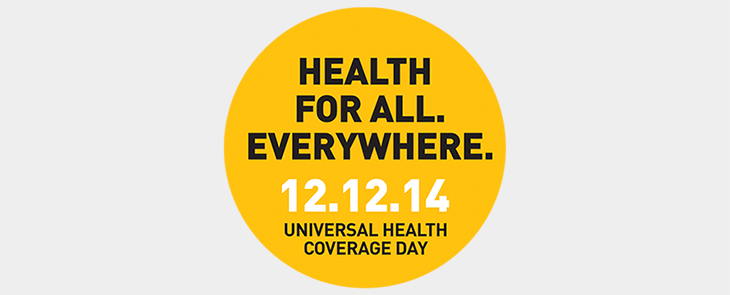The Health Policy Project ended in 2016. Work continued under Health Policy Plus (HP+) until 2022.
NEWS & VIEWS

Photo by Universal Health Coverage Day via the Rockefeller Foundation’s Transforming Health Systems Initiative
By Ron MacInnis, Deputy Director for HIV, Arin Dutta, Senior Economist, and Andrew Zapfel, Policy Analyst, Health Policy Project, Futures Group
December 12, 2014
This piece was originally posted on the Center for Global Health Policy's Science Speaks blog: http://sciencespeaksblog.org/2014/12/12/universal-health-coverage-requires-quality-healthcare-access-for-stigmatized-populations/.
In order to celebrate progress and hold leaders accountable, the global community has recognized December 12th as Universal Health Coverage Day. According to the World Health Organization, the goal of universal health coverage is, “to ensure that all people obtain the health services they need without suffering financial hardship when paying for them.” Universal health coverage (UHC) requires long-term planning, development, political commitment. It also requires the recognition that every country has diverse citizenry with unique needs – particularly when addressing sexual and reproductive health. Universal health coverage requires and understanding that “one size does not fit all.”
Governments and country stakeholders continue to explore the best ways to finance health care for their people. Preventing catastrophic health costs for the world’s poorest and most marginalized is a fundamental goal. Many countries have started this process and are strategizing how best to increase the depth (proportion of services covered), breadth (extent of the population covered), and height (extent of financial protection) of health coverage, while making trade-offs across these three dimensions. This includes identifying the means of financing, designing benefit packages, and identifying coverage targets, yet they are not the only pressing needs countries have in achieving UHC.
The universal health coverage agenda has been gaining momentum for a solid decade, yet it was just recently the world reached consensus that there should be deliberate focus on equity, as the poor, disadvantaged and marginalized are often the last to access health care and have the poorest health outcomes. Despite this recognition, much work still remains. Limited capacity in healthcare settings to understand the specialized needs of key populations and poor people, and reconciling UHC with country-level policy or legislation that impedes peoples’ rights to health access will continue to prevent countries from achieving UHC and the associated health and economic benefits. Within every country are communities of people that face stigma and discrimination due to race, sex, gender identity, caste, sexual orientation, religion, political ideology, or any trait that marks them as “different” from the majority. This discrimination takes many forms and examples can be found in all countries.
Healthcare workers, through prejudice and/or lack of knowledge often deny services to patients. Fear of stigma and discrimination alone often prevents sex workers, men who have sex with men (MSM), transgendered persons, or people who inject drugs from looking to access health services. These conditions, unless addressed, will prevent countries from ever being able to truly achieve universal health coverage. As the global community works to achieve a major global goal with universal health care – an “AIDS-Free Generation” – key populations at risk of HIV are too-often being denied access to basic services due to lack of investment, violence, criminalization and social marginalization. Promising approaches to overcome this are being tested in countries by engaging civil society organizations to complement the limited capacity of overburdened healthcare workers to reach out to the poor and marginalized and bring them into the health system.
To truly ensure universal health coverage, we urge the global community to do the following to address universal health coverage for marginalized communities:
- Ensure Vulnerable Communities Are Included in the Sustainable Development Goals: The global community has included universal health coverage within the Post-2015 Sustainable Development Goals discussion. Yet, access to health services for marginalized communities continues to be left out of the conversation. Stronger advocacy from all stakeholders needs to occur to ensure vulnerable communities are included in determining the targets of the health goal. A decade of focusing on UHC proves that UHC will not “trickle” down to reach the most vulnerable.
- Include and Fund Interventions for Vulnerable Communities in National Strategies: In 2013, one-third of 46 African National Strategic Plans for HIV did not include any proposed government intervention for MSM, going against epidemiologic evidence that shows how MSM are in need of intervention and programming on the continent. Government policies and legislation must focus on populations most in need of social services and protection and provide scientifically based interventions, fully funded, and agreed upon by the international community.
- Engage with Civil Society So All Voices Are Represented: Civil Society organizations are often the only advocates for the health and human rights needs of poor and marginalized populations. Civil Society therefore must be engaged in the planning of policies and programing within countries and at the global level. Donors and international organizations must also work to build the capacity of civil society to effectively advocate for the needs of vulnerable groups. Through such advocacy, governments can be pressured to be more engaged with civil society to ensure all voices are represented and to develop the best ways of achieving universal health coverage for all of their citizens.
Taking these approaches into account will move us considerably further in ensuring fairness and financial equity for those who need universal health coverage that will benefit both the individual, no matter who they are, and their nation.
What's New
- Something to Build On: “Innovation Exchange” Celebrates the Health Policy Project’s Close and a New Beginning
- What Will it Take for Tanzania to Achieve ART Targets and Ensure Long-Term Sustainability of the HIV Response?
- Helping Kenya’s County Leaders Advocate for Increased Health Investments
- HPP Holds Working Meeting on Ensuring Responsible PEPFAR Transitions for Key Populations
- Health Policy Project Celebrates 2016 International Women's Day
- HPP Staff Participate in White House Conference on HIV Stigma Reduction

